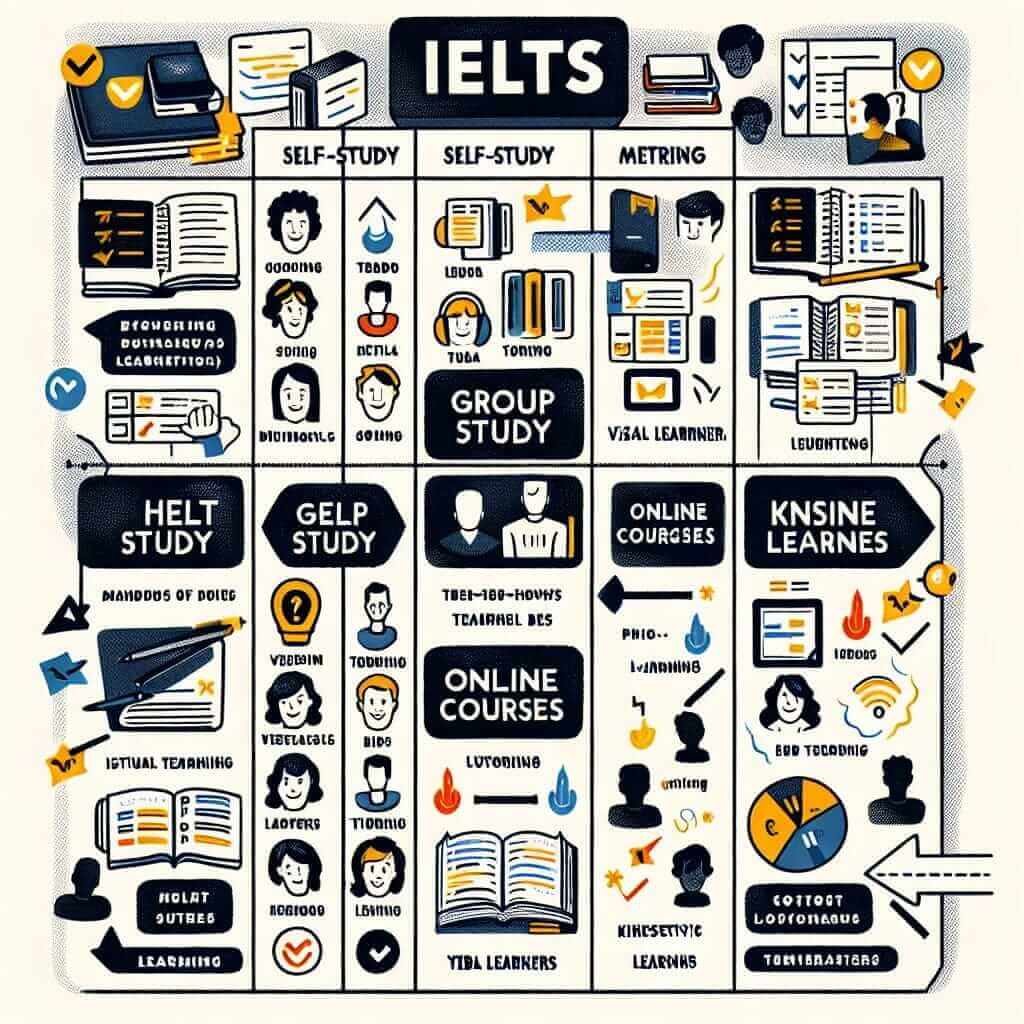The Importance of Finding Your Ideal IELTS Learning Method
In the world of IELTS preparation, one question echoes louder than any other: “What method of learning works best?” It’s a question that has plagued countless test-takers, each hoping to unearth the secret formula for IELTS success. The truth is, there’s no magic bullet, no one-size-fits-all answer. The most effective approach is the one that resonates with your learning style, your strengths, and your individual needs.
This article delves into the heart of this crucial question, providing insights and strategies to help you navigate the diverse landscape of IELTS learning methods. Whether you’re a visual learner, a social butterfly, or a self-proclaimed grammar geek, understanding your unique learning profile is the key to unlocking your full potential.
Identifying Your Learning Style: A Journey of Self-Discovery
Before diving into specific methods, it’s crucial to understand how you learn best. Are you someone who:
- Thrives in a classroom setting, feeding off the energy of others? You might be a social learner, benefiting from group study and interactive activities.
- Prefers to study independently, at your own pace and in your own space? You might be a solitary learner, finding solace in self-study resources and personalized learning plans.
- Grasps concepts best through visual aids, diagrams, and mind maps? You might be a visual learner, leveraging visual resources and color-coding techniques to enhance your understanding.
- Responds well to auditory input, like lectures and audio recordings? You might be an auditory learner, maximizing your learning through podcasts, audiobooks, and voice recording exercises.
- Learns by doing, through hands-on activities and practical application? You might be a kinesthetic learner, engaging in role-playing scenarios, real-world practice tests, and interactive learning platforms.
Effective IELTS Learning Methods: A Tailored Approach
1. Structured Courses: A Strong Foundation for Success
For many, enrolling in a structured IELTS preparation course provides a solid framework for success. These courses, whether online or in-person, offer:
- Comprehensive Curriculum: Covering all four IELTS sections (Listening, Reading, Writing, and Speaking) in detail.
- Expert Guidance: Led by experienced IELTS instructors who provide valuable feedback and strategies.
- Structured Learning Path: A clear roadmap for progress, ensuring you stay on track with your studies.
- Mock Tests and Practice Materials: Ample opportunities to familiarize yourself with the test format and assess your progress.
2. Self-Study: Embracing Independence and Flexibility
If you thrive on independence and prefer to set your own pace, self-study might be your ideal route. This approach demands discipline and organization but offers unmatched flexibility. Key resources for self-study include:
- IELTS Preparation Books: A plethora of books cater to different learning styles and skill levels.
- Online Resources: Websites and apps offer interactive exercises, practice tests, and grammar explanations.
- Language Exchange Partners: Connect with native English speakers online or in your community to practice your speaking and listening skills.
3. Blended Learning: The Best of Both Worlds
Combining the structure of a course with the flexibility of self-study, blended learning offers a dynamic and adaptable approach. This method allows you to:
- Benefit from expert guidance while maintaining control over your learning pace and schedule.
- Access a wider range of resources, tailoring your study plan to your specific needs and preferences.
- Enjoy greater flexibility, fitting your IELTS preparation around your existing commitments.

Illustrative Examples from Real IELTS Tests
Let’s examine how different learning methods can be applied to a specific IELTS Speaking test prompt:
Prompt: Describe a time you had to overcome a challenge.
- Structured Course: Your instructor might guide you through brainstorming ideas, structuring your response using the PAR (Problem-Action-Result) method, and practicing your delivery with a partner.
- Self-Study: You could use a preparation book or online resource to learn vocabulary related to challenges and success. You might record yourself answering the prompt and analyze your fluency and coherence.
- Blended Learning: You might attend a webinar on effective storytelling techniques, then use a language exchange app to practice recounting your experience with a native speaker.
Tips for Maximizing Your Learning, Regardless of Method
- Set Realistic Goals: Break down your IELTS preparation into manageable steps, celebrating small victories along the way.
- Practice Consistently: Dedicate time each day to honing your English skills. Consistency trumps cramming every time.
- Seek Feedback and Learn from Mistakes: Embrace constructive criticism and view mistakes as opportunities for growth.
- Stay Motivated: Remind yourself of your reasons for taking the IELTS and visualize your success.
Conclusion: Embracing Your Unique Path to IELTS Success
The “best” method of learning IELTS is ultimately the one that empowers you to learn most effectively and achieve your desired score. Embrace your individual learning style, explore different approaches, and discover the method that unlocks your full potential. Remember, the journey to IELTS success is a marathon, not a sprint. With dedication, perseverance, and the right approach, you can conquer this challenging exam and open doors to a world of opportunities.